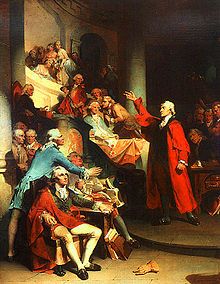The Senate passed the Jumpstart Our Business Startups Act, JOBS Act, with a bipartisan vote of 73-26, with all the “no” votes coming from Democrats. The legislation will make it easier for small businesses to use the Internet to raise small investments from lots of people, a technique known as “crowdfunding.” :
The legislation combines six smaller bills that change Securities and Exchange Commission rules so small businesses can attract investors and go public with less red tape and cost. It eases rules on advertising and permits startups to use the Internet and other social media to solicit a large number of small-scale investors.
So why is this not such a good bill? Basically, as Mark Gongloff of Huffington Post explains, because it rolls back “investor-protection regulations, some of which date back to the 1930s, and some of which have been passed as recently as 2002 in the wake of Wall Street shenanigans from the 1990s tech bubble to Enron.”
The bill purports to make it much easier for small firms to raise money, either through private “crowdfunding,” essentially raising money online, or by going public. At its heart is the persistent myth, relentlessly propounded by Wall Street, that there are a million Facebooks out there waiting to thrive and create jobs if only the government would just get the heck out of the way. [..]
Investment banks can now issue research reports on the companies they take public — meaning we’ll be back to the days when analysts can pump up “POS” stocks they then dump on unwitting customers — removing a prohibition set by Sarbanes-Oxley in 2002.
Web sites can pitch new companies directly to investors, raising the specter of “boiler rooms” preying on your grandmother to pry away her retirement money.
To give Senate Majority Leader Harry Reid (D-NV) some credit, he did manage to get one amendment passed that would provide some investor protections:
required companies that use crowdfunding to provide financial statements to investors. Companies seeking between $100,000 and $500,000 in capital would have to get independent accountants to review these statements. Audited financial statements would be required for companies seeking more than $500,000 in capital.
The amendment also limits the total amount that a company can raise through crowdfunding to $1 million. The House bill would allow companies to raise up to $2 million, if they provide audited financial statements.
In addition, the amendment requires Internet intermediaries — the web sites that will offer crowdfunding investment opportunities to the public — to register with the SEC.
An amendment that would have tightened certain shareholder definitions, and prevented public companies from “going dark” if their shareholder number falls below a certain threshold, failed to pass a straight majority vote.
Dan Primack at CNN’s Fortune best describes what does and doesn’t matter about the bill and states his the reason for his opposition:
Emerging growth companies: Okay, this is where I move from ambivalence to opposition. The idea here is to make it easier for small private companies to go public, by reducing the costs associated with such an action. It does so by reducing certain existing investor protections, including one that prevents investment banking analysts from offering pre-IPO research on their firm’s own clients. Here is what I wrote on the subject, back in January:
Going public is not supposed to be a cakewalk. We’ve already been through an IPO environment where all you needed was a clever URL and a fuzzy mascot, and the results weren’t pretty. I’m not suggesting that last year’s issuers are all future members of the Fortune 500, but shouldn’t a successful listing signal to retail investors that experienced institutions took a hard look at the issuer and considered it worthy of consideration? How can that still be true if those institutions get to see only two years of audited financial statements instead of three? Or if analysts working for a company’s underwriting bank can publish pre-IPO research (albeit with a disclaimer)?
Sen. Bernie Sanders (I-VT) gives his scathing criticism of the bill, calling it the “Con Job Bill”:
“The so-called ‘JOBS Act’ is an extremely anti-consumer, anti-investor, and anti-jobs bill. As currently drafted, the bill is opposed by the Securities and Exchange Commission chairman (as well as past SEC chairmen appointed by both political parties); AARP; the AFL-CIO; the Consumer Federation of America; Consumers Union; and the Council of Institutional Investors, among many others. There is good reason for the opposition.
“At best, this bill could make it easier for con artists to defraud seniors out of their entire life savings by convincing them to invest in worthless companies. At worst, this bill has the potential to create the next Enron or Arthur Andersen scandal or an even worse financial crisis.
“Have we learned nothing? Deregulating Wall Street led to the worst financial crisis since the 1930s. Now the same people who caused this horrible recession are telling us that more Wall Street deregulation will create jobs. Give me a break. I strongly support providing small businesses with the tools they need to create jobs. Sadly, that’s not at all what this bill will do.”
Calling this the “JOBS” Act is a misnomer because, as Yves Smith notes at naked capitalism, “In reality, the only jobs it is likely to create will be due to the resulting explosion in stock scamsters and bucket shop operators.”
And there is no worry that this bill will pass in the House. House Majority Leader Eric Cantor (R-VA) has schedule a vote for early next week.
Here come the “Penny Stocks.” Good job, Barack

 Dr. Kim’s name was not among those widely bandied about since Mr. (Robert B.) Zoellick announced his plans to move on last month. Highly respected among aid experts, Dr. Kim is an anthropologist and a physician who co-founded Partners in Health, a nonprofit that provides health care for the poor, and a former director of the department of H.I.V./AIDS at the World Health Organization. [..]
Dr. Kim’s name was not among those widely bandied about since Mr. (Robert B.) Zoellick announced his plans to move on last month. Highly respected among aid experts, Dr. Kim is an anthropologist and a physician who co-founded Partners in Health, a nonprofit that provides health care for the poor, and a former director of the department of H.I.V./AIDS at the World Health Organization. [..] On this day in 1775,
On this day in 1775,
Recent Comments